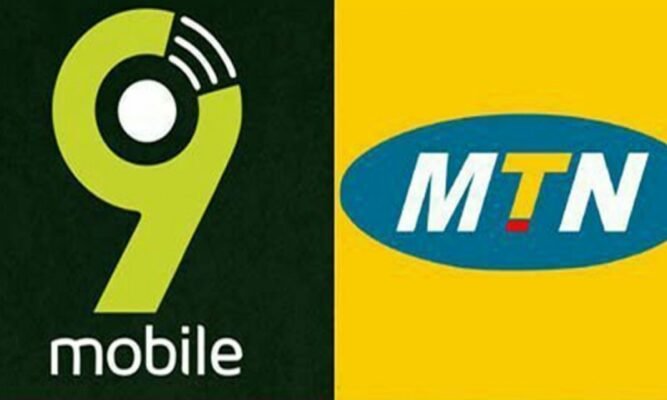Nigeria’s telecom sector faced one of its worst periods in May 2025, with a sharp spike in service disruptions traced mainly to fibre cuts and power failures. Data from Uptime, a network monitoring platform, showed that 9mobile and MTN Nigeria were the most affected operators, sparking concerns over telecom reliability in Africa’s largest mobile market.
Between January and May 19, 9mobile suffered 31 major outages, while MTN experienced 25. Most incidents were linked to fibre cuts, often caused by vandalism or ongoing construction. The impact was severe—millions of subscribers lost access to mobile data, calls, SMS, and USSD services. 9mobile, which recorded the longest restoration times, struggled the most. Globacom and Airtel also faced challenges, with 20 and 13 major incidents respectively.
“The average network handles up to 30 minor disruptions every day,” MTN Nigeria’s Chief Technical Officer Yahaya Ibrahim previously told media outlets. While minor glitches are common, these major breakdowns tend to cripple essential services for hours.
Nigeria’s Weak Infrastructure Exposed
Unlike South Africa and Kenya, where telecom responses are quicker thanks to stronger infrastructure, Nigeria continues to grapple with deeper challenges. In South African cities like Johannesburg and Pretoria, emergency WiFi support can arrive in under 90 minutes. In Nigeria, however, even major fibre lines now suffer regular cuts, and operators often delay responses.
y
On 14 May, 9mobile’s network in Lagos went dark for over 8 hours due to power issues, affecting local governments such as Agege, Apapa, and Eti-Osa. Just days before, a fibre cut had knocked out services in northern states including Kano, Katsina, and Jigawa. In a particularly long outage, some base stations in Kebbi and Sokoto only came back online after more than 15 days, when 7,000 litres of diesel were delivered to power them.
While all providers face challenges, MTN has shown quicker turnaround in restoring service. A May 11 outage affecting Bayelsa and Rivers states was resolved in just over an hour. The longest wait time for the operator in May was a little over three hours in Benue. In contrast, 9mobile’s slower recovery times underscore a weaker infrastructure system.
Regulatory, Political Friction Adds to Telco Burdens
In April, MTN faced a different kind of disruption—not from technology but from government. The Kogi State Utility Infrastructure Management and Compliance Agency shut down 16 MTN sites, cutting off another 155 connected locations. The standoff dragged on for nearly 23 days before being resolved in May, revealing the added pressure telecom companies face from state-level interventions.
Amid mounting challenges, MTN is investing aggressively. The company committed ₦800 billion to network improvements in 2025. ₦200 billion has already been spent in Q1, marking a 159% increase compared to last year. According to MTN’s Chief Customer and Experience Officer, Ugonwa Nwoye, the goal is to deliver “better customer experience, reduced congestion, faster internet speeds, and wider network reach.”
Part of MTN’s solution includes using motorcycles in cities like Lagos to help engineers beat traffic and reach problem sites faster. These bikes are also deployed for regular inspections of fibre lines to prevent disruptions before they start.
For 9mobile, the stakes are higher. With subscribers shrinking from over 20 million in 2015 to under 3 million in 2025, its poor outage performance could hinder its comeback. Long recovery times and unreliable service may push even more users away.













2 replies on “MTN, 9mobile Spark Worry as May Sees Telecom Chaos”
[…] Defence Corps (NSCDC) to fortify the country’s telecommunications network. The deal comes amid increasing threats to telecom towers, fibre cables, and other infrastructure vital to Nigeria’s digital […]
[…] journey began in August 2020, when the NCC gave MTN and 9mobile the green light to run a three-month pilot to test the roaming setup. That trial ended in October […]